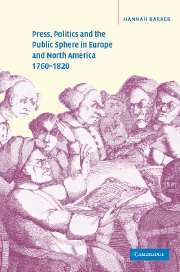Book contents
- Frontmatter
- Contents
- Notes on contributors
- Acknowledgements
- Introduction
- 1 The cosmopolitan press, 1760–1815
- 2 The Netherlands, 1750–1813
- 3 Germany, 1760–1815
- 4 England, 1760–1815
- 5 Ireland, 1760–1820
- 6 America, 1750–1820
- 7 France, 1750–89
- 8 The French revolutionary press
- 9 Italy, 1760–1815
- 10 Russia, 1790–1830
- Index
10 - Russia, 1790–1830
Published online by Cambridge University Press: 05 July 2009
- Frontmatter
- Contents
- Notes on contributors
- Acknowledgements
- Introduction
- 1 The cosmopolitan press, 1760–1815
- 2 The Netherlands, 1750–1813
- 3 Germany, 1760–1815
- 4 England, 1760–1815
- 5 Ireland, 1760–1820
- 6 America, 1750–1820
- 7 France, 1750–89
- 8 The French revolutionary press
- 9 Italy, 1760–1815
- 10 Russia, 1790–1830
- Index
Summary
The emergence of politicised civil society is often preceded by the growth of public opinion. This can in turn be traced to those social spaces where an increasingly responsive press interacted with other sites of debate. In this way the press, along with venues such as learned societies, salons, coffee houses, cafés, clubs, theatres, and masonic lodges, helped to foster the exchange of ideas and formation of opinion. In the West, these institutions arose in close succession, but in Russia, the pace of change was slower. Often thought to have been a country where political stringencies resulted in stunted growth, Russia in the early nineteenth century was, however, in a state of flux, as this chapter will demonstrate. This was true despite the autocracy's secure position and the lack of attempts to introduce public participation in government on the French model. Indeed, the first real tremor came only in 1825 with the Decembrist Revolt that accompanied the rise of Nicholas I to the throne, and the upheaval was quelled at no great cost to the autocracy.
Even government officials were often unable to influence policy in significant ways. Granted, there were exceptions. In 1826, the elder statesman and legal specialist M. M. Speranskii first proposed using locally produced provincial gazettes as a vehicle for government decrees, statistical data and information of general interest or benefit to the public.
- Type
- Chapter
- Information
- Publisher: Cambridge University PressPrint publication year: 2002

